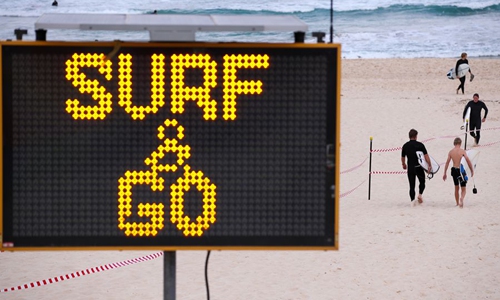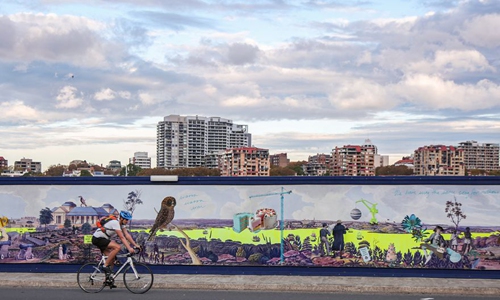Australian PM announces plan to lift coronavirus restrictions
Source:Xinhua Published: 2020/5/8 17:51:49 Last Updated: 2020/5/8 16:18:49

Surfers walk at Bondi Beach in Sydney, Australia, on April 28, 2020. (Xinhua/Bai Xuefei)
Australian Prime Minister Scott Morrison has announced a three-stage plan to lift Australia's coronavirus restrictions.
Following a meeting of the national cabinet comprised of the prime minister and state and territory leaders, Morrison on Friday afternoon announced the plan to restart Australia's economy by July.
Morrison said it would be up to state and territory governments to decide when each stage comes into effect.
"Today, National Cabinet agreed a three-step plan and a national framework to achieve a COVID-safe economy and society," he said.
"It is our goal to move through all of these steps to achieve that COVID-safe economy in July of this year."

A man rides on a street in Sydney, Australia on April 10, 2020. (Xinhua/Bai Xuefei)
Under stage one, restaurants and cafes will be allowed to re-open and Australians will be allowed to have up to five visitors in their home and gather in groups of 10 outdoors.
The maximum gathering size will be increased to 20, some interstate travel will be allowed and gyms, cinemas, galleries and beauty parlours will re-open under stage two.
All interstate travel will be allowed, pubs re-opened and maximum gathering sizes increased to 100 under stage three.
According to the Treasury, more than 850,000 jobs will be restored by stage three.
Morrison said that it would be a gradual process and that Australians should expect more outbreaks as the restrictions are lifted.
"In this plan, we walk before we run," he said.
"We know we need to be careful to preserve our gains, but we also know that if we wish to reclaim the ground we have lost, we cannot be too timid.
"There will be risks, there will be challenges, there will be outbreaks, there will be more cases, there will be setbacks."
"Not everything will go to plan."
The national cabinet will review the progress of each stage in every state and territory every three weeks.
Morrison was joined by Brendan Murphy, the chief medical officer, who said that 50 percent of the new cases in last week were related to clusters in Victoria and New South Wales (NSW).
"This is what we expect to see and what we'll continue to see and that's not such a concern if we're getting on top and managing these outbreaks as we have in those two cases," Murphy said.
"Six out of eight states have had multiple days of zero cases. But they all know that that doesn't mean the virus isn't still in their community and all of us have to be very careful as we move forward."
Murphy said that the three-step program relied on the Australians continuing to follow social distancing rules and maintaining high standards of personal hygiene.
"We could lose the battle that we have won so well, so far," he said.
"Every Australian has to do their bit."
Posted in: ASIA-PACIFIC